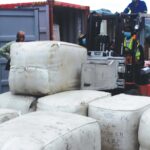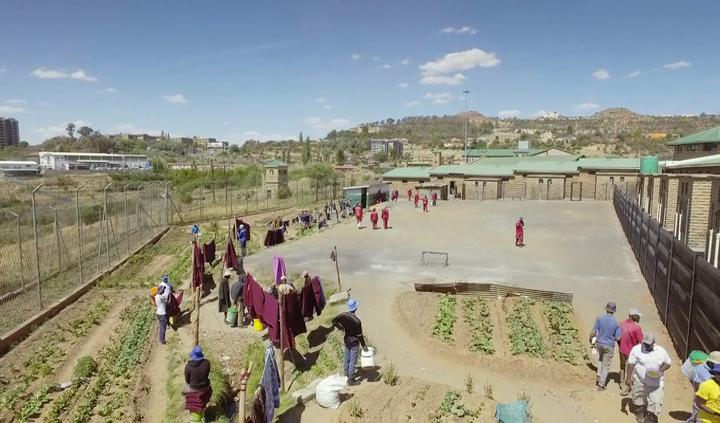Lesotho wool cleared for sale to China

SHARE THIS PAGE!
By ‘Majirata Latela
Lesotho wool and mohair farmers are to begin selling their products direct to China clearly indicating Lesotho as the country of origin; this after China lifted its ban on neigbouring South African wool and mohair on health reasons.
China had imposed repeated bans on South Africa’s wool and mohair following recurrent outbreaks of foot and mouth disease in that country, with the most recent reported earlier this year.
The ban had negatively had a bearing on the country’s animal fibre due to its location. It was exported to China labelled as South African wool.
Now Lesotho’s wool and mohair farmers and brokers are optimistic that the lifting of the ban will improve the environment for international trade. Also, the backlog of wool that was kept in warehouses in South Africa will now be sold and farmers will enjoy their proceeds.
Commenting on the developments this week Maluti Wool and Mohair Centre general manager and OVK area manager in Lesotho, Seelan Pillay said the latest ban was effected towards the end of May this year and that meant that most of Lesotho wool was not sold as China is the only country that buys 80 percent of Lesotho’s wool. He said other European countries only buy 20 percent of Lesotho’s wool as they buy only the highest grades of wool.
“In the next two weeks we will be having a wool auction in Port Elizabeth (PE) and the market is looking very promising because we will be having buyers from China participating in the auction. Also, the wool that was actioned just before the ban was imposed will be shipped to the buyers. Now that the ban is lifted, we are looking at about 80 containers that will be shipped from PE harbor.
“By the end of September, we should be having another auction and we will be having major buyers from China who are interested too buy Lesotho’s wool. Even if it’s too early to tell but the competition looks promising,” he said.
He stressed that there is a plan on the table to market the wool in Lesotho but now that the ban has been lifted the plan has been halted.
However, he said marketing and selling the wool in Lesotho is very difficult because there is shortage of containers to transport all the wool to the harbour.
Another challenge, he said, is that it is expensive to courier fiber from Lesotho to South Africa and then to China. Again, most buyers are based in Port Elizabeth and “if they have to come to Lesotho then there is a chance that some may not come and the competition will not be stiff.”
The spokesperson of the Lesotho National Wool and Mohair Growers Association, Khotsang Moshoeshoe told the publication this week that the ban on South Africa had negative impact on Lesotho. He emphasized that competition was not good and most of the wool that was bought during the ban was the only clean wool.
He said most of Lesotho’s wool is greasy and if only clean wool was bought during the ban that meant most of the wool was not auctioned and adversely affecting many farmers who depend entirely on the sale of fibre.
“As the wool and mohair farmers we are slowly recovering and there is not much recovery that can be seen on the ground. After Stone Shi saga that left most of wool and mohair farmers in poverty, Covid-19 pandemic hit us very hard so much that some farmers have not been able to recover at all. They are still down on their knees.
“While we were working on recovering. South Africa was slapped with a ban and we were brought to our knees. Now the challenge that we are facing as farmers is animal theft, our animals get stolen every single day and there is not much that is done by those in power to save us from the thieves. Every day we report cases of animal theft and the police fail to help us trace our animals because of lack of equipment and transport,” Moshoeshoe said.
He added that in the year 2023/24 wool and mohair farmers are planning to market and sell fibre from Lesotho. He said they are looking at using Thaba Bosiu- storage for the project since it is currently not in use after the Stone Shi left the industry.
On the one hand, ministry of agriculture and food security’s director marketing, Lekhooe Makhate also stamped on the issue that China’s ban on South Africa’s wool and mohair impacted badly on Lesotho’s wool and mohair farmers as most of the wool is stored in that country before it could be shipped to other countries.
He pointed out that Lesotho should find ways of ensuring that it is not affected by the ban every time South Africa is banned.
In July 2020 this publication reported that Lesotho’s wool and mohair worth millions of Maloti was allegedly stuck in South Africa, as that country’s fibre was not allowed into any market abroad due to restrictions imposed when it suffered an outbreak of Foot and Mouth Disease (FMD) that initially occurred in November 2019 and January 2020.
Prime Minister Moeketsi Majoro and the minister of agriculture and food security had a meeting where they were trying to resolve the matter so that the 16 000 bales of wool stuck in warehouses in South Africa can be allowed entry into China. China is the biggest market for Lesotho’s wool.
However, even after the said meeting which was held on June 4 2020 the matter was never dealt with decisively.
The team comprised of ministry of agriculture’s principal secretary and three officers, three representatives from the Lesotho National Wool and Mohair Growers Association (LNWMGA), Development for Peace Education, Transformation Resource Centre, Lesotho Council of Non-Governmental Associations, ministry of foreign affairs, minister of small business as well as the minister of trade and industry.
The ordeal happened just after farmers in January 2020 resumed exporting their wool and mohair through South African broker, BKB (Pty) Ltd, after whose trucks were seen in numbers taking the commodity to the company’s warehouse in Port Elizabeth.
This followed the passing of the Agricultural Marketing (Wool and Mohair Licensing) (Amendment) Regulation 2019 No 68 in the national assembly and the release of the Act in a government gazette of November 29 2019.
South African media reported earlier this month that the Agricultural Business Chamber of South Africa (Agbiz) said wool exports were banned when a foot-and-mouth disease (FMD) outbreak was detected in the northern provinces of South Africa in early 2022.
“Agbiz welcomes the decision of the People’s Republic of China to once again accept wool exports from South Africa. The decision is a welcome development within the context of an increasingly volatile environment for international trade.
“When South Africa relinquished its FMD-free status in 2019, a protocol was agreed upon with the People’s Republic of China to mitigate any chance of contamination by registered warehouses following the time/heat inactivation protocol,” the publication reported.

240 inmates released on parole
6 days ago



Cash-strapped LEC hikes staff salaries
12 days ago
Indian businessman claims military base
12 days ago
Lesotho gets Starlink internet access
12 days ago

Communities empowered to protect environment
14 days ago
Alliance boosts MCC fleet
15 days ago